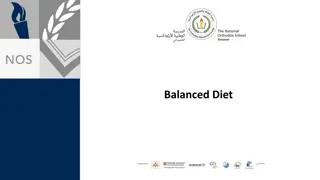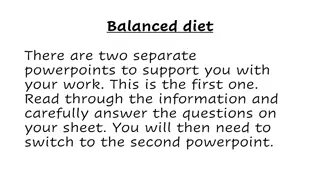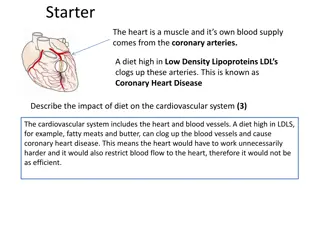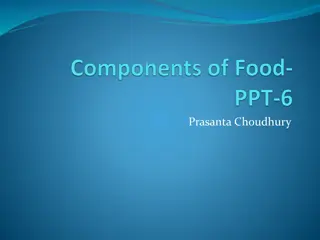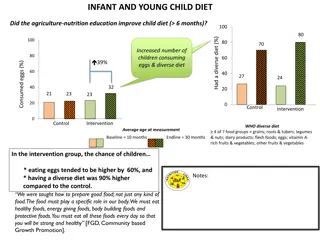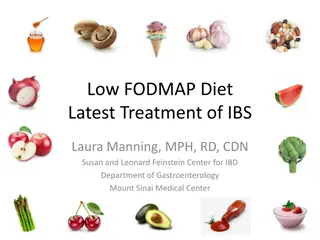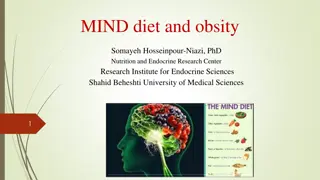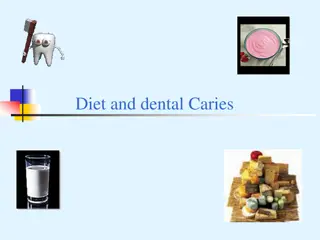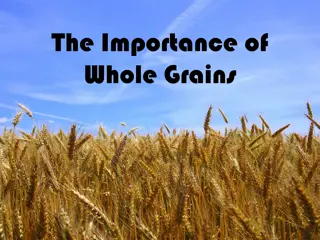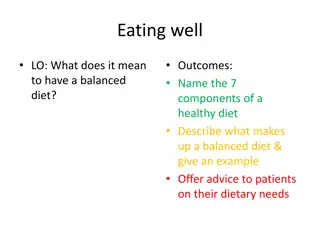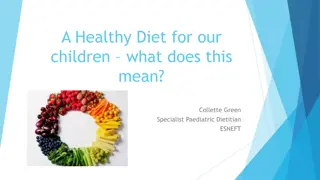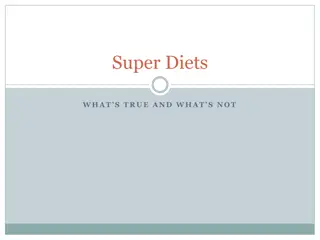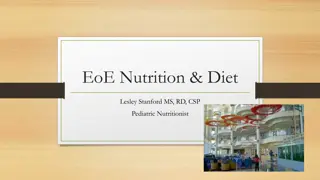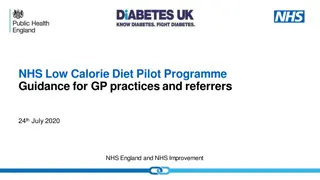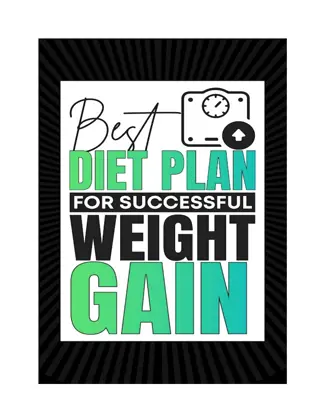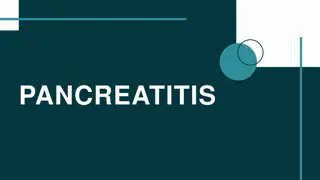The Impact of Diet on Your Health
Explore how diet influences your weight, learn about essential nutrients like fats, fiber, water, and vitamins, understand the effects of a high-fat diet, and discover why moderation is key with salt, sugar, and caffeine intake.
Download Presentation

Please find below an Image/Link to download the presentation.
The content on the website is provided AS IS for your information and personal use only. It may not be sold, licensed, or shared on other websites without obtaining consent from the author.If you encounter any issues during the download, it is possible that the publisher has removed the file from their server.
You are allowed to download the files provided on this website for personal or commercial use, subject to the condition that they are used lawfully. All files are the property of their respective owners.
The content on the website is provided AS IS for your information and personal use only. It may not be sold, licensed, or shared on other websites without obtaining consent from the author.
E N D
Presentation Transcript
Unit V Wellness, Fitness and First Aid Chapter 3 - You Are What You Eat Section 1 You Are What You Eat
What You Will Learn to Do Evaluate how diet impacts life
Objectives 1. Explain how calories consumed versus calories used affects body weight Identify daily required food and portions Identify sources and benefits of fiber in diet Describe the importance of water Describe the possible effects of a diet high in fat and cholesterol Explain why salt, sugar and caffeine should be used in moderation 2. 3. 4. 5. 6.
Key Terms Nutrients - Substances found in food that allow the body to function properly Fats - Nutrients made up of fatty acids that are insoluble in water and provide energy to the body Deficient - Having too little of something, such as a nutrient in the body
Key Terms Calories - The amount of energy it takes to raise the temperature of one kilogram of water one Celsius; a measurement of energy Metabolism - The chemical process by which the body produces energy and maintains vital functions Vitamins - Nutrients that occur naturally in plant and animal tissue and are required for proper function of the body
Key Terms Minerals - Natural chemical elements of the earth used by the body to supply necessary nutrition Carbohydrates - One of the various neutral organic compounds composed of carbon, hydrogen and oxygen (including starches and sugars) produced by plants and used to provide energy necessary for growth and other functions
Key Terms Protein - Nutrients that are made of amino acids and that maintain body tissues and supply energy to the body Osteoporosis - A condition characterized by a calcium deficiency in the bone mass; the body pulls calcium from the bones, causing them to lose their density and possibly leading to fractures
Key Terms Fiber - Course food made mostly of carbohydrates, such as bran or broccoli, that serves to stimulate and aid the movement of food through the digestive tract Diabetes - A disease in which the body is unable to use sugars properly Stimulant - Nutrients that occur naturally in plant and animal tissue and are required for proper function of the body
Introduction A healthy lifestyle includes good nutrition. Your body will not function properly without the right nutrients. A balanced diet helps maintain proper weight and lower risk of disease.
Introduction Eating on the run too often can affect your nutrition and weight. You may consume too many fats and too few vegetables and fruits, leaving you deficient in nutrients. Eating balanced meals, even on the run: contributes to proper weight provides energy for physical activity supplies nutrients for good health.
Introduction Although too many fats can be bad for you, your body needs a certain amount of fat from the foods you eat. Many necessary vitamins are fat-soluble only; meaning that without fat, these vitamins cannot be absorbed by the body.
Balancing Calories You must eat to fuel your body. The more active you are, the more fuel you need. Even remaining very still, your body uses calories for basic body functions. You do not have control over these functions. For basic functions, some people use more calories, and some use less. Those who use more are said to have a high metabolism.
Balancing Calories Your body uses calories in everything you do. Unlike your basic functions, you can control how many calories you voluntarily use. You use more calories walking than watching TV. You use more calories walking fast than walking slowly. The more effort you put in, the more calories you burn.
Balancing Calories When your body uses the same amount of calories as you eat daily, you weight remains the same. If you eat more calories than your body uses, you gain weight. If you eat less calories than your body uses, you lose weight. It s a balance between calories eaten and calories used.
Balancing Calories Karen has gained 10 pounds in the past year, mainly because she is making some poor food choices and skipping regular exercise. Compare her lunch with her friend Andrea s choice:
Balancing Calories Karen Andrea Lb. Plain double Hamburger Mayonnaise French Fries Large Chocolate Shake Salad with Grilled Chicken Light Italian Dressing Small Soda
Balancing Calories Andrea: Do you ever eat fruit or vegetables? Karen: Sometimes; do you? Andrea: I had a hamburger and fries yesterday; that s why I ordered a salad today. If you eat fruit and vegetables more often than fried foods, it will help maintain your weight.
Balancing Calories Most people need only 2000-3000 calories per day. Karen had 75% of hers in just one meal. Karen Calories 540 Andrea Calories 200 Hamburger (1/4 pounder) Salad with grilled chicken Mayonnaise 100 Lite dressing 50 French Fries Lrg Chocolate shake Total 360 540 Small soda 150 1540 Total 400
Balancing Calories If she didn t want a salad, Karen could have still chosen a lighter meal similar to her original choices. Calories Calories Original Choice New Choice Hamburger (1/4 pounder) 540 2 Ounce Hamburger 275 Mayonnaise 100 Lettuce & Tomato 10 French Fries Large Chocolate shake 360 540 Ketchup & Mustard Regular Size French Fries Small Chocolate shake 23 220 330 Total Total 1540 858
Balancing Calories Calories of Some Common Foods Tomato (medium) 25 Whole Milk (cup) 150 Egg (large) 80 Green Pepper (medium) 20 Wheat Bread (slice) 65 Ice Cream (cup) 270 Cheese Pizza (slice) 290 Potato (medium) 45 Apple (medium) 80
Balancing Calories If Karen really wants to lose weight, she should have a salad, work to reduce calorie intake and get more exercise. (Tennis burns _____ times as many calories as watching TV.) three Eat sensibly. Exercise. Lose weight.
The Importance of a Proper Diet to Your Health What you eat to get calories is as important as the amount you eat. If you eat like Karen, you give your body too much fat, cholesterol, salt and sugar which causes health problems to start when you are young. At your next physical, ask the doctor about your cholesterol, blood pressure and blood sugars you may be surprised.
What Should You Eat? The Food Guide Pyramid indicates daily servings of 6 food groups to get the proper nutrients for your body.
What Should You Eat? If you follow the guidelines, you will get the vitamins and minerals the body needs; and enough carbohydrates, protein, and fat for energy. If not, you increase your risk of disease. For example, lack of calcium can lead to osteoporosis.
What Should You Eat? Your body also needs fiber to aid digestion and prevent cholesterol, fats and toxic minerals from entering your blood stream. It also helps control diabetes by balancing blood sugar levels.
What Should You Eat? You find fiber in: Raw or lightly cooked vegetables Fresh fruit, nuts and beans Whole wheat or bran breads Cereals and crackers
What Should You Eat? Water is the final nutrient vital to keeping you alive. The body is more than __ % water. Water lost must be replaced. 65 Water: Aids digestion Regulates temperature Carries vitamins and minerals through the body Is important for the removal of waste
What Should You Eat? Water is the final nutrient vital to keeping you alive. The body is more than __ % water. Water lost must be replaced. 65 Drinking five to six glasses a day is recommended except on days when you exercise then you should drink more!
Eating in Moderation Your body needs fat, but too much is harmful. It forms plaque in artery walls leading to high blood pressure and an increased risk of heart disease.
Eating in Moderation Too much salt forces the body to retain unnecessary water and may contribute to high blood pressure. Many foods, especially prepackaged and restaurant foods, already have added salt so don t add more!
Eating in Moderation Sugary foods like candy and soda supply empty calories and few, if any, nutrients. Avoid them while dieting, and do not eat them as a replacement for nutritious foods. Many fruits and vegetables contain sugar, but they also contain ________. nutrients
Eating in Moderation Limit your intake of coffee, tea and sodas that contain caffeine, a stimulant. Caffeine can temporarily reduce drowsiness but can: Upset your stomach Make you irritable Give you diarrhea
Conclusion Your body needs food for energy. The amount needed depends on how active you are, and how many calories your body uses for its basic functions. You know you are getting the right amount when you maintain your ____ weight. ideal
Conclusion Food supplies you with energy along with the nutrients to operate properly and lower the risk of ______. disease Eating a healthy, balanced diet and exercising regularly increases your chances of a long, strong, and disease-free life.
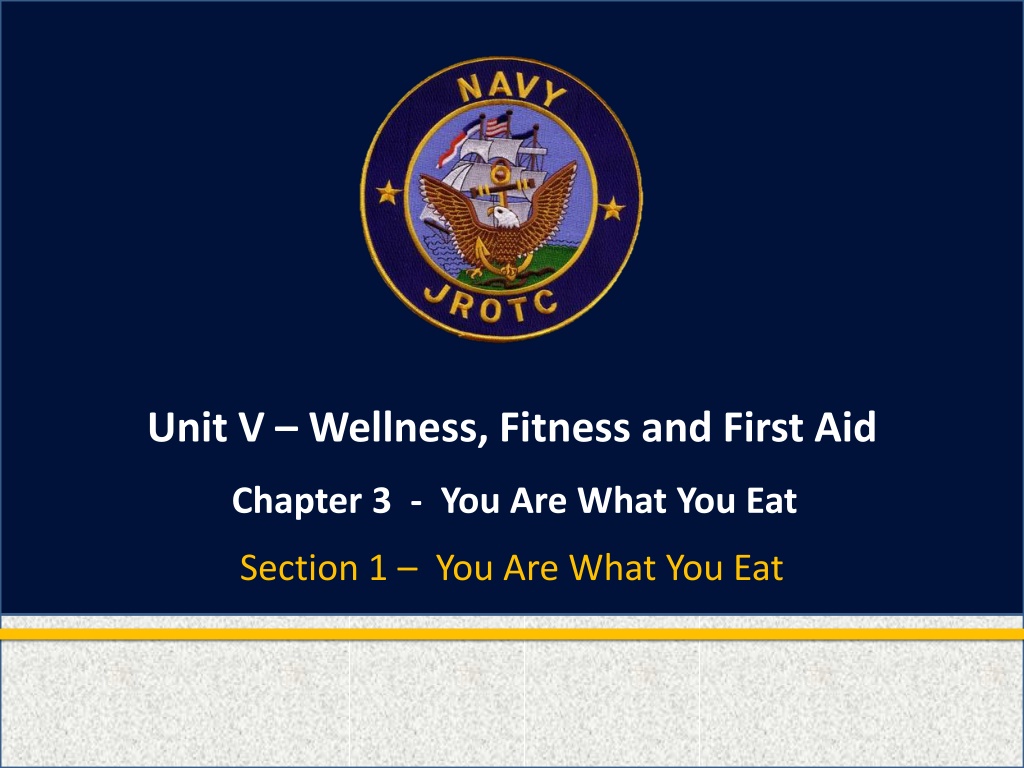


















![READ [PDF] Dash diet Cookbook for beginners: 365 days of simple, healthy, low-s](/thumb/2057/read-pdf-dash-diet-cookbook-for-beginners-365-days-of-simple-healthy-low-s.jpg)
![[✔PDF✔⚡] Renal Diet Cookbook for the Newly Diagnosed: The Complete Guide to](/thumb/68079/pdf-renal-diet-cookbook-for-the-newly-diagnosed-the-complete-guide-to.jpg)
